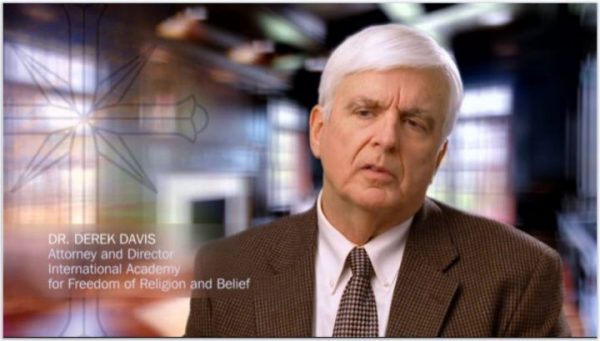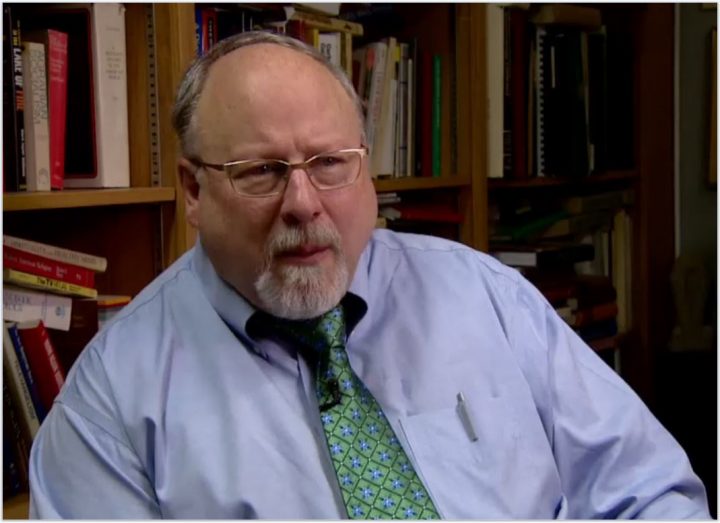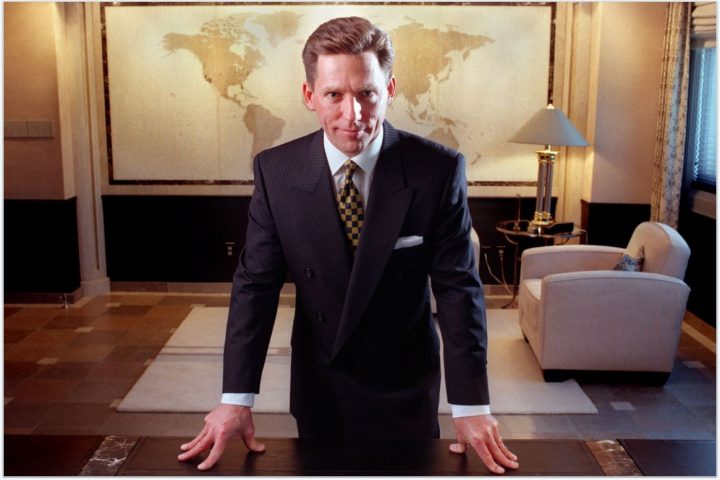Rod Keller continues to dig deep into Scientology’s online and social media offerings, and this week, he takes another look at the organization’s newest website…
This week we spoke with another non-Scientologist featured on Scientology’s new website promoting the organization’s recognition and acceptance as a religion. We also spoke with Dr. Stephen Kent about how some academics view Scientology, and how such positive viewpoints might be developed.
Dr. Derek Davis is the former director of the J.M. Dawson Institute on Church-State Studies at Baylor University. He is an author, the former editor of the Journal of Church and State, and is also an attorney now in private practice. He is a recipient of the Human Rights Achievement Award by Scientology’s Freedom magazine in 2004. At Scientology’s new website, here’s some of what Davis says in a video…
I had the opportunity to read a number of his writings, and I don’t think there’s been anybody that I’m aware of who was more prolific as a writer. So quite an impressive fellow. There have been people throughout history who were brilliant men. I think of people like Isaac Newton and Albert Einstein, Thomas Jefferson – these people were brilliant people, but those people didn’t have the range that he had.
AdvertisementSo I think the world could benefit a lot from L. Ron Hubbard. It is an ideology that has captured the minds and hearts and trust of millions of people around the world. A lot of people had their lives improved, greatly enhanced, through reading about L. Ron Hubbard and his ideas, becoming members of the Church of Scientology. And millions would testify to the benefits of being a Scientologist. So in that respect he has made a real contribution to human life.
When we spoke to Davis this week, he recalled making several videos for Scientology, but none recently. He was unaware that the video is available for viewing on the Internet. “Which video? I don’t know where I was, it might have been in L.A. or in my office. It is probably six or seven years old.” He first encountered Scientology as an academic. “I was Director of the Church-State Institute at Baylor which served to examine the relationship between religion and government, both domestically and internationally. Scientology was very strong in their recognition of the separation of church and state and their support for freedom of religion. They did a lot in the community. They had an active drug prevention program, and supported poverty programs. I made some friends in Scientology, and read some of their materials, which are voluminous. There were some from Texas, some from DC, and some from Hollywood, Germany, Russia and different countries. So I got to know a lot of them. I didn’t always agree with what Hubbard wrote, but he was obviously a very intelligent person. I read Dianetics, and it was interesting. He dealt with how to access the human mind, and how to deal with people’s hang-ups.”
I asked about allegations of human rights abuses by Scientology, and the reports of mistreatment from former members. “I’m aware of all those problems, all those accusations. I even interviewed some former members, it was probably 15 years ago. They were pretty critical, and I’ll just say that I wouldn’t be a member. A lot of that may have some basis in fact, some may not. There are critics of all religions throughout history. There are Muslims and Jews who accused the Christians of a massive genocide. In the Bible, the book of Judges when Israel came into Palestine, they destroyed literally tens of thousands of people. Same thing with the Crusades. So every religion at some point has been accused of being bad or heretical. The Protestant Reformation was an accusation that the Catholic religion was heretical and abusive, and before that the Catholics broke from the Orthodox Church for some of the same reasons.
“I try to look at the positive side of Scientology – the good things that they do. Do they do harm? They probably do some harm. But you could make charges like that against any religion throughout history.”
I asked where he got the figure about there being millions of Scientologists. “I think there are millions. I forget the number that they claim, about 4-6 million Scientologists. I never did any independent study on the veracity of that figure, so it could be off by quite a bit.”
Dr. Stephen Kent is Professor of Sociology at Alberta University and studies harmful groups including Scientology. I sent the link to Dr. Davis’ video and asked him for comment.
It’s astonishing in this day and age that he can heap praise on Hubbard in the face of so much critical information about him and the organization that he founded. He praises Hubbard for being something of an astronomer and a biological researcher! Scientology must have fed a lot of information to him, which he accepted without checking other sources. Even 15 years ago, critical but insightful information about Scientology was on the Internet. An accurate commentator needs to be intellectually curious, and this curiosity doesn’t seem to exist here. He also says that he spoke to former members. If they made allegations about Scientology’s own human rights and religious freedom violations he doesn’t seem to have assimilated the implications of these probable violations. Intellectual curiosity should have motivated him to pursue further whatever the former members relayed to him, but he likely did not treat their insights with the seriousness that they deserved.
Baylor is a private Baptist university. I’m not familiar with how conservative the institution is, but in some conservative circles people are afraid that religion in general is under attack by secularists and that religion as a whole needs to respond to the attack. Scientology’s claims to be a persecuted religion may be enough to make one come to its defense. While academics with faith-based backgrounds don’t agree with Scientology’s doctrinal claims, they still may feel that even ‘wrong’ religion is better than no religion. By supporting Scientology, one is indirectly protecting one’s own religion and opposing a more secular society. Also in these conservative circles, the widespread distrust and fear of secular media likely prevents them from either viewing or accepting information about Scientology that appears in various print, audio, and visual sources. This distrust is not just of things like celebrity tabloids, but more broadly extends to the intellectual press, most recently in evidence by the widespread support for Donald Trump.
I don’t think he is representative of academia, and most academics would not believe the version of Hubbard’s life-story promoted by Scientology. A perspective exists within the sociological study of deviance known as the “bad apple” theory, which claims that organizational problems are the fault of a few renegade members.When sociologists, however, examine organizational deviance, we tend to look at structural issues – issues which assume that individuals usually are acting according to the rules that the structure requires of them. That structural perspective can include the realization that psychological, social-psychological, and psychiatric issues involving organizational leaders can set the norms for members’ beliefs and behaviors. Hubbard’s likely malignantly narcissistic personality certainly colored the doctrines of Scientology and the people who operated within it, and now Miscavige’s personality does the same. I’m not clinically qualified to say definitively what constitutes his personality construction, but at the very least he seems to be problems around aggressive and suspicious impulses. One can’t understand contemporary Scientology and the Sea Org today without understanding what goes on within Miscavige’s head.
Our great thanks to Dr. Kent for providing us such a detailed reply.
— Rod Keller
——————–
Our Scientology year-in-review: June
We’re continuing our look back at the year of 2016 here in the Underground Bunker, and today we’re looking at the stories we published in June.
Ross Blocher and Carrie Poppy finished up their nine-episode podcast series after their infiltration of the Church of Scientology had finally been discovered by church officials. As we said then, “their shows were consistently great, and they filled in a gap in Scientology watching that we just don’t get from reading Scientology materials or interviewing ex-members.” In the end, Carrie pronounced Scientology “ridiculously creepy.”
With the passing of the Greatest, we recalled the time in 1981 when Scientology took a run at Muhammad Ali by roping him into a goofy music video, “Get High on Yourself.” Ali was one of many sports and entertainment celebrities to take part, including Bruce Jenner, Magic Johnson, Julius “Dr. J” Erving, Henry Winkler, Carol Burnett, Hervé Villechaize, and even a few film legends, including Paul Newman and Bob Hope.
We’ve been following the story of Dani and Tami Lemberger since the mission they run in Haifa, Israel, the Dror Center, broke away from the Church of Scientology in a bold rebellion. On June 9, we published Dani’s “declare,” the church’s document that spells out a member’s excommunication. It’s getting more rare to get our hands on declares, so it was very interesting to read one about a former member who has so publicly stood up to Scientology leader David Miscavige.
Another bold move we admired was Cathy Schenkelberg’s decision to take her one-woman show on the road. Cathy has distilled her experiences as a Scientology “public” who gave the church about a million dollars into a stage show, “Squeeze My Cans,” that has been getting rave reviews. She plans on taking her show in the road again in the coming months.
With shrinking membership and controversies on many fronts, how does David Miscavige push back for public acceptance? Would you believe, re-issuing L. Ron Hubbard’s ponderous 1982 science fiction doorstop Battlefield Earth after 34 years? Rod Keller took a close look at the campaign to push the book, which was definitely an effort by the church itself.
On June 20, we wrote our first story about the Russian-language media kerfuffle being kicked up by a Kazakh mother who said her 20-year-old daughter, Rigina Hikmatulina, was being held against her will by the Church of Scientology in Florida. Later, we heard from the family itself in this dramatic story.
A few days later, we had a lot of fun writing about what happens when Scientology sort of permanently messes with your ability to think. Just take a look at our rundown of Randy McDonald’s bizarre self-published fever dream “The Watergate Hoax,” and you’ll see what happens when you take L. Ron Hubbard’s words a little too seriously.
On June 25, we reported the death of Megan Shields, a Scientologist doctor that many former Sea Org members remember as the person they were sent to for check-ups and treatment. Shields also vouched for Scientology’s quack drug rehab program, Narconon.
It was also in June that we were the first to let the cat out of the bag and announce that Leah Remini was shooting a television series about Scientology. We had no way of knowing what a huge hit Scientology and the Aftermath was going to become.
And finally, we had fun with the newest round of Scientology “OT Phenomena” from Advance! magazine. When its spokespeople send letters to the media, Scientology pretends to be about personal growth and social betterment. But these great magazine pieces show what really keeps Scientologists in year after year and forking over the big bucks: They want the super powers told in these ghost stories by high-level OTs.
A LOOK BACK AT JUNE 2015: We wrote about that time Jim Jones talked about Paulette Cooper from his Guyana compound. We wrote about a person in our book, the inspirational Len Zinberg. We did some live-blogging from the epic Toronto conference organized by Jon Atack. We broke the news that Scientologist Ponzi schemer Reed Slatkin had died. Some poor schlub went to prison after trying to hack Mike Rinder and your proprietor on behalf of Scientology. And we had our biggest audience yet with Paulette Cooper in Clearwater, the belly of the beast.
A LOOK BACK AT JUNE 2014: Another distressing disconnection story: Where is Sami Sterne? A rare audio recording captures L. Ron Hubbard and his wife Mary Sue using an e-meter to come up with the space cooties portion of Scientology. Why we think Original OT 8 is not a hoax — the George White story.
A LOOK BACK AT JUNE 2013: Channel 4’s documentary about Marty Rathbun, Scientologists at War, Neil Gaiman’s Scientology history behind his novel The Ocean at the End of the Lane, and Joe Childs on Denise Gentile’s blunts.
——————–
 Posted by Tony Ortega on December 26, 2016 at 07:00
Posted by Tony Ortega on December 26, 2016 at 07:00
E-mail tips and story ideas to tonyo94 AT gmail DOT com or follow us on Twitter. We post behind-the-scenes updates at our Facebook author page. After every new story we send out an alert to our e-mail list and our FB page.
Our book, The Unbreakable Miss Lovely: How the Church of Scientology tried to destroy Paulette Cooper, is on sale at Amazon in paperback, Kindle, and audiobook versions. We’ve posted photographs of Paulette and scenes from her life at a separate location. Reader Sookie put together a complete index. More information about the book, and our 2015 book tour, can also be found at the book’s dedicated page.
Learn about Scientology with our numerous series with experts…
BLOGGING DIANETICS: We read Scientology’s founding text cover to cover with the help of L.A. attorney and former church member Vance Woodward
UP THE BRIDGE: Claire Headley and Bruce Hines train us as Scientologists
GETTING OUR ETHICS IN: Jefferson Hawkins explains Scientology’s system of justice
SCIENTOLOGY MYTHBUSTING: Historian Jon Atack discusses key Scientology concepts
Other links: Shelly Miscavige, ten years gone | The Lisa McPherson story told in real time | The Cathriona White stories | The Leah Remini ‘Knowledge Reports’ | Hear audio of a Scientology excommunication | Scientology’s little day care of horrors | Whatever happened to Steve Fishman? | Felony charges for Scientology’s drug rehab scam | Why Scientology digs bomb-proof vaults in the desert | PZ Myers reads L. Ron Hubbard’s “A History of Man” | Scientology’s Master Spies | Scientology’s Private Dancer | The mystery of the richest Scientologist and his wayward sons | Scientology’s shocking mistreatment of the mentally ill | Scientology boasts about assistance from Google | The Underground Bunker’s Official Theme Song | The Underground Bunker FAQ
Our Guide to Alex Gibney’s film ‘Going Clear,’ and our pages about its principal figures…
Jason Beghe | Tom DeVocht | Sara Goldberg | Paul Haggis | Mark “Marty” Rathbun | Mike Rinder | Spanky Taylor | Hana Whitfield










